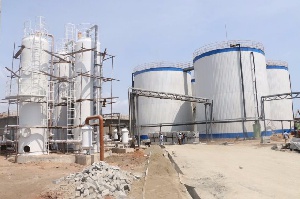 The Plant consists of a Primary Treatment stage, including screening and primary settling
The Plant consists of a Primary Treatment stage, including screening and primary settling
President John Mahama has officially shutdown waste hub Lavender Hill in Accra, while commissioning the Korle Lagoon septic treatment plant Friday.
The $15 million project which is a partnership between Zoomlion and the government of Ghana is expected to improve the waste situation in the capital city.
The plant, designed for a lifespan of 20 years and more will be owned and operated by Sewage Systems Ghana Limited.
The Septage Treatment Plant with a maximum treatment capacity of 2,400 cu.m/day and a design capacity of 2,000 cu.m/day is unique as there are few plants in the world designed for treating septage.
The plant is the first of its kind in the subregion. It consists of a Primary Treatment stage which includes screening, primary settling, raw Septage and sludge dewatering.
Speaking at the inauguration, President Mahama urged Ghanaians to change their attitudes towards waste management. He also expressed government’s gratitude to the media for their consistent reportage on the deplorable situation that existed at the lavender hill
Over the last century, Lavender Hill has served as dumpsite for a large proportion of Accra's Septage (faecal matter from our septic tanks and public toilets).
The plants, designed for a lifespan of 20 years and more will be owned and operated by Sewage Systems Ghana Limited after the commissioning.
Lavender Hill beach has been used as a dumpsite for a large proportion of Accra's Septage (faecal matter from our septic tanks and public toilets) since the 1970s. This practise has had an immense effect on the environs adjacent to the beach, with devastating impacts on environmental sanitation, hygiene, health care and marine life quality (a source of sustenance and protein for many of Accra's inhabitants).
A suitable, environmentally sustainable and lawful alternative to this practise is thus timely. The construction of the Lavender Hill Plant commenced in 2012, at the cost of over USD 25 Million.
The Septage Treatment Plant with a maximum treatment capacity of 2,400 cu.m/day and a design capacity of 2,000 cu.m/day is unique as there are few plants in the world designed for treating septage.
The vast majority of wastewater treatment plants are designed for processing the contents of sewer systems, (as the Mudor waste water treatment plant is doing) and not septage, which is delivered to disposal sites via suction trucks.
This plant is thus not only the first of its kind in Ghana, but a first for the sub-region, and an innovation that can be replicated in many emerging market cities with limited sewer network coverage, or the complete absence of sewer network.
The Plant consists of a Primary Treatment stage which includes screening, primary settling, raw Septage and sludge dewatering.
A Secondary Treatment stage which includes Anaerobic Digestion (UASB), Anoxic-Oxic Digestion and Secondary Settling.
A Tertiary Treatment stage which includes Ultra Violet Disinfection; Biogas Utilization (Combined Heat and Power), Digested Sludge Dewatering.
The plant comprises also of a modern laboratory which will test the both the influent and the effluent qualities of the waste water. The final effluent will meet the EPA standards and will also be pumped back into the system for reuse in the plant.